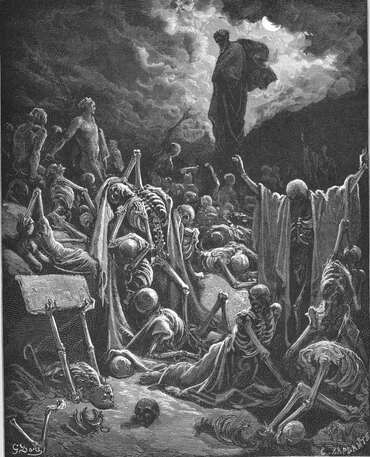Apocalypse Explained # 420
420. Upon the earth, nor upon the sea, nor upon any tree, signifies everywhere in the spiritual world, even to its ultimates, in those who have any perception. This is evident from the signification of "the earth," as being the whole spiritual world, consequently all angels and spirits there. This is the signification of "the earth" in the general and nearest sense, because in the spiritual world, the same as on our globe, there are lands, mountains, hills, plains, valleys, and also seas (respecting which see above, n. 304, 342, 413). It is evident also from the signification of the "sea," as being the ultimates of the earth in the spiritual world, because the last boundaries or limits there are seas (respecting which see above, n. 342); also from the signification of "tree," as being perception and also knowledge (of which presently). This being the signification of "earth," "sea," and "tree," the three joined together in one idea signify all things in the spiritual world even to its ultimates in those who have any perception. A "tree" in general signifies perception and knowledge, because a "garden" signifies intelligence, and all intelligence is according to knowledges and a perception of them; this is why each kind of tree signifies something pertaining to knowledge [scientia] and intelligence. Because a "tree" signifies in general perception and knowledge, it also signifies the interiors of the mind with man, and also the whole man; for a man is such as are the interiors that belong to his mind, and these are such as is the perception from knowledges. (That a "tree" signifies the interiors that belong to the mind, and also man himself, see above, n. 109, 110; that a "tree" signifies perception and knowledge, see Arcana Coelestia 103, 2163, 2682, 2722, 2972, 7692; that the ancients had Divine worship in groves under trees, according to their significations, n. 2722, 4552; that this was prohibited with the Jewish nation, and why, n. 2722; that "paradises" and "gardens" signify intelligence, n. 100, 108, 3220; also in the work on Heaven and Hell 176; and above, n. 110)
Bones

Bones are strong and supportive, providing a framework for our bodies and making motion and action possible. They are also the least "alive" part of our bodies, with much of their structure made up of a mineral matrix. As such, they represent a strong, supportive, functional but innately nearly dead part of our spiritual makeup: the "proprium."
The proprium is the part of us that feels life as our own, that perceives our loves and our thoughts as originating within ourselves. If we simply follow the proprium without looking to the Lord, it will lead us to a hellish state, in which we believe ourselves to be all-powerful and deny the existence of the Lord altogether.
Bones, on their own, will go dry, brittle and completely dead. If, however, we acknowledge the Lord and follow him, that's like putting flesh on the bones and being alive. In that case the bones – strong, supportive, protective and as alive as they can be – represent the proprium in relation to intellect, the part of us that perceives our thoughts as our own but turns them toward the Lord.






